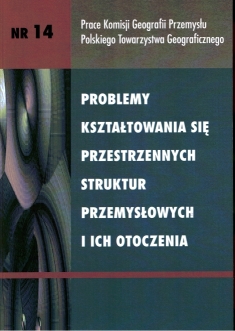The emerging knowledge economy: an analysis of the issues and possible outcomes of the information age in the context of a Central Eastern European creative city
DOI:
https://doi.org/10.24917/20801653.14.5Keywords:
knowledge economy, information age, creative cityAbstract
The Polish economy remains one of the most promising and changing economies in Europe. Its attractiveness, caused by geopolitical location, human and natural potential, world famous history and transition processes, creates a unique set of features that attract both foreign investment and regional investors. Facing the last environmental changes, mainly connected with the processes of the transition to the market and knowledge-based economy, it still develops and changes. In Poland there exists a set of major economic organisms that changes the country and creates most of its GDP. The metropolitan areas, including the example of Cracow, discussed above, are stimulators and attractors of both human and economic development. The open question that remains unsolved is how the metropolitan areas can improve their keystone performance. Some of the propositions of such improvements are the creative city strategies that have numerous possible outcomes. Most of the outcomes previously analysed in the literature are of economic nature. The conclusion I draw is that the creative city strategy has an enabling force - it asks the questions about the citizens’ identity and seeks for answers in all social aspects of the metropolitan life. Finally, it strongly influences the collective vision of the agglomeration’s future that, in this case, might be the most crucial element of the final results of the strategyDownloads
Metrics
References
Anderson, S., Ray, P., 2001, The Cultural Creativities: How 50 million People are Changing the World, New York.
Carlaw, K., Oxley, L., Walker, P., Thorns, D., Nuth, M., 2006, Beyond the Hype: Intellectual Property and the Knowledge Society / Knowledge Economy in “Journal of Economic Surveys”, Vol. 20, Issue 4.
Commission of the European Communities, 2002, Towards a Research Area in “Communication from the Commission to the Council, the European Parliament, the Economic and Social Committee and the Committee of the Regions”, accessed online: http://ec.europa.eu/research/era/pdf/com- 2000-6-en.pdf (02.11.2008). Edvinsson, L., 2002, Corporate Longitude, Harlow.
Florida, R., 2002, The Rise of the Creative Class: And How It’s Transforming Work, Leisure, Community and Everyday Life, New York.
Gumula, W., 2008, Teoria osobliwości społecznych. Zaskakująca transformacja w Polsce, Warszawa Halbwachs, M., 1969, Społeczne ramy pamięci, Warszawa.
Hall, P., 1998, Cities in Civilization, New York.
Harrison, C., 2002, Accommodating the New Economy: The SANE Space Environment Model, “Journal of Corporate Real Estate”: Vol. 4 Issue 3.
Hospers, G., van Dalm, R., 2005, How to Create a Creative City? The Viewpoints of Richard Florida and Jane Jacobs in: “Foresight”, Vol. 7, Issue 4.
Landry, C., 2000, The Creative City: A Toolkit for Urban Innovators, Strout.
Mendieta, E., 2001, Invisible Cities: a Phenomenology of Globalization from below, “City”, Vol. 5, Issue 1.
Murray, A., Greenes K., 2007, From the Knowledge Worker to the Knowledge Economy, “The Journal of Information and Knowledge Management Systems”, Vol. 37, Issue 1.
Pascale, R., 1999, Surfing the Edge of Chaos, “Sloan Management Review”, Spring.
Powell, W., Snellman, K., 2004, The Knowledge Economy, “Annual Review of Sociology”, Vol. 30.
Richards, G., 2005, Development for the Creative Industries: the Role of Higher and Further Education Media and Sport, “Creative Industries Higher and Further Education Forum”.
UNESCO, 2008, Towards Sustainable Strategies for Creative Tourism, CLT/CEI/CID/2008/RP/66. Seetharaman, A., Bin Zaini Sooria, H.H., Saravanan, A.S., 2002, Intellectual Capital Accounting and Reporting in the Knowledge Economy, “Journal of Intellectual Capital”, 3(2).
Staniszkis, J., 1994, Dylematy okresu przejściowego. Przypadek Polski, [in:] Zmierzch socjalizmu pań- stwowego. Szkice z socjologii ekonomicznej, Warszawa.
Statistical Office in Krakow, 2007, Statistical Yearbook, Krakow.
Downloads
Published
How to Cite
Issue
Section
License
Articles are published under the terms of the Creative Commons License (CC BY-ND 4.0; Attribution– NoDerivs).

